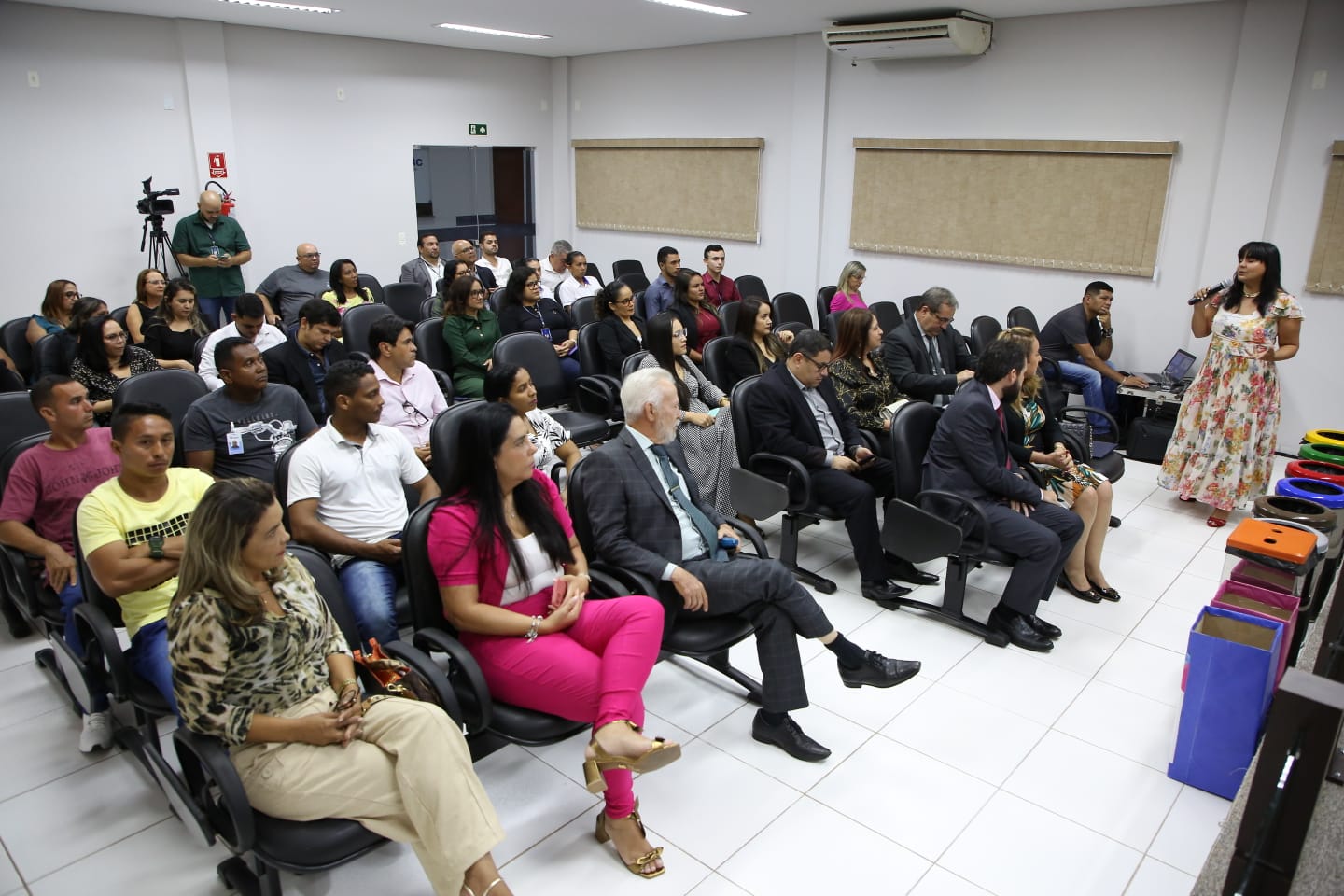
The servers of the Forum of the city of Araguatins participated, this Monday afternoon (January 23rd), in the Selective Collection workshop, a training session about solid waste that aims to provide knowledge about the Sustainable Logistic Plan.
Held by the Superior School of the Judges of the State of Tocantins (ESMAT), the action, which is already in its twelfth class, was attended by Justice João Rigo Guimarães, president of the Court of Justice of the State of Tocantins (TJTO), and Justice Ângela Prudente.
With a 5-hour workload, the Workshop was given by the facilitator Leila Maria de Sousa Jardim and it was aimed at public servers, Judges, trainees, employees, and accredited personnel of the Judiciary of the State of Tocantins located in the judicial district of the city of Araguatins.
Project
On the occasion, the Court, through the Social-Environmental Management and Social Responsibility Coordination (COGERSA), launched the Selective Collection Project in the district. The waste produced in the courthouse, which previously ended up in the landfill of the city, will now be destined for recycling.
Justice Ângela Prudente, president of the Manager Commission of the Sustainable Logistic Plan of the Judiciary, highlighted that the waste management contributes to the preservation and defense of the environment, the sustainable economic development, the promotion of economic, social and environmental responsibility and the quality of life itself in the work environment besides significantly impacting the indexes for obtaining the CNJ Quality Award.
The Project started at the head office of the Court of Justice of the State of Tocantins and later it was implemented in the courts of the city of Palmas, Araguaína, Gurupi, Porto Nacional, Paraíso of Tocantins, Alvorada, and now in the city of Araguatins, the first district of the “Bico do Papagaio” region to receive the action.
“Much beyond a good sustainable practice, the Solidary Selective Collection Project is an instrument of social responsibility, because, besides being ecologically correct, it enables the social inclusion of a significant portion of the population, such as the waste collectors and the respective cooperatives”, said the Justice, explaining that the project works from the awareness part, educating about the need for the correct disposal of waste and seeking to mobilize and integrates magistrates and public servers, outsourced and other employees to adopt sustainable practices, and combat all forms of environmental degradation.
In the opportunity, the president of the PLS Management Commission of the Judiciary of the State of Tocantins invited all magistrates, employees, and collaborators to join the project and become multipliers of this action in favor of a balanced environment for the present and future generations. “I urge everyone to participate effectively and contribute to the action. We have to give our contribution for the improvement of the quality of life of human beings, transforming our reality into a future full of possibilities”, emphasized the Justice, registering the unconditional support of the Justice João Rigo Guimarães, president of the Court of Justice of the State of Tocantins, to the project.
Judge Nely Alves da Cruz, director of the Forum of the city of Araguatins, congratulated the Court of Justice of the State of Tocantins for the project and said that she and the employees of the courts are used to separating waste for recycling.
Project management
The Solidary Selective Collection project intends to improve the management of financial and material resources, as well as to promote social inclusion and the generation of income and jobs, since the residues will be destined to the cooperative of collectors registered in the city.
The action meets the determination contained in Resolution No. 400 of the National Council of Justice, 2021, and in the Sustainable Logistic Plan of the Judiciary of the State of Tocantins, which provides for the proper disposal of all types of produced waste with the implementation of solidary selective collection.
Individual and collective contribution
For the employee of Cogersa, Leila Jardim, the success of the project depends on the participation of everyone, each one making their individual and collective contribution. "Besides a better quality of life in the work environment, the project will provide other benefits, and the biggest beneficiary is the environment", said the employee, who in the occasion spoke about the project and waste management to the employees and magistrates of the court.
Generated residues
The main residues generated by the Judiciary of the State of Tocantins are: paper, cardboard, Styrofoam, plastic cups, pet bottles, aluminum, plastics, glass, coffee grounds, carpets, banners, tires, lubricating oil, paint, health residues, CDs; toners and other computer supplies, cleaning product packaging (sponge, tissues, rubber, etc.), spray and aerosol cans, electro-electronic residues, and construction and renovation residues.




